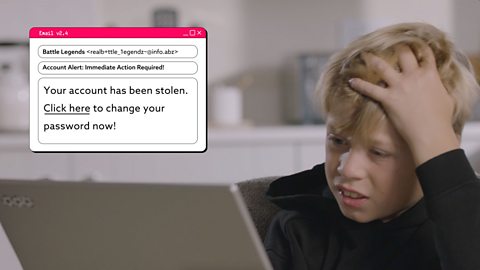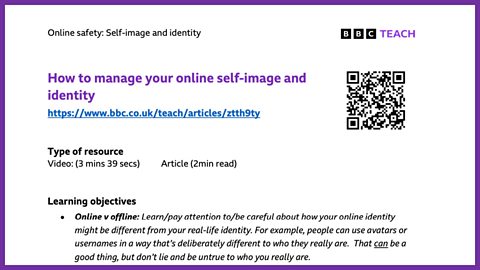The internet can help you explore and express who you are in loads of fun, creative ways. You can try out different avatars, outfits and usernames and be all kinds of characters in all kinds of games without having to do it in real life. It's exciting to see how others present themselves too. It's a space to explore your interests and show your unique personality. But remember that not everything online is real. Some people may pretend to be someone they're not, and comparing yourself to others can make you feel bad. So always be true to the best version of you.
Imagine your fancy dress party where everyone is wearing fun and creative costumes. Some people are dressed as superheroes. Some as animals, some in costumes that are completely out of this world. Now think about the costume you choose. Maybe you dress as your favourite character, or maybe you'd wear something bright and colourful that makes everyone smile. It's your choice. And at the party, it's all about showing who you are in a fun way. But remember, underneath the costume, you'll still use, just like at the party when you go online. You can use different costumes like avatars, usernames, and pictures to represent yourself. Being yourself is the best way to shine. And it's okay if what you like is different from what others like. What matters most is being true to you online and offline.
Whoa! I can make my cat to look however I want. Blue hair. Sparkly shoes. Ooh. Wings. That looks awesome. Now it's time to choose what my avatar likes to do. What should I pick? Skateboarding looks cool. And lots of kids in school like it. Maybe if I put that, they'll think my avatar's really cool too. But I don't really like skateboarding that much. Wait, this isn't really me. What do I like? Oh, yeah. I love reading fantasy books and painting. But what if my classmates don't think they're interesting enough? My teacher said it's okay to be different. I should be proud of what makes me. Me. These are the things I really love. It doesn't matter what anyone else thinks. This is me. I'm going to play this game as my true self.
Good choices. Here's my take home advice. Be aware that your online identity might differ from who you are away from the screen. That can be good and fun, but don't be untrue to who you are. The internet can influence how you see yourself and others. Be kind to yourself and avoid comparing yourself to others online. If something online makes you feel uncomfortable, sad, or unsure about your identity or someone else's, it's always okay to ask a trusted adult for help. That's it. Now I'm off to try on a new outfit.
Video summary
- Emma-Louise Amanshia introduces the topic of self-image and identity online, giving examples of how someone might express themselves.
- The analogy of a fancy dress party is used to further illustrate the idea of self image and identity online.
- Dramatisation of a young person exploring their image and identity online, deciding how they should best design their avatar and to represent themselves as their true self.
- Emma-Louise offers final top tips and advice.
Video: 3min 39sec
Learning objectives
- Online v offline: Learn/pay attention to/be careful about how your online identity might be different from your real-life identity. For example, people can use avatars or usernames in a way that’s deliberately different to who they really are. That can be a good thing, but don’t lie and be untrue to who you really are.
- Stay positive: Understand how the internet can influence how you see yourself and others. It’s important to be kind to yourself and not compare yourself to others online.
- Ask for help: Know that if something online makes you feel uncomfortable, sad, or unsure about your identity, or someone else’s, it’s okay to ask a trusted adult for help or support.
Glossary
- Self-image: the way you feel about yourself and your personality.
- Identity: what makes you you (e.g. your background, what you like and dislike, your hobbies, etc.).
- Avatar: an online character that represents you.
- Username: the name you create for yourself online.
Topic introductions and starters
Before the video:
- What do you think we mean by the word ‘identity’?
- How might someone show their identity when they are online?
- Why might someone not be their true self online?
After the video:
- Why do you think the character in the film started by choosing skateboarding as an activity for their avatar?
- Why did the character in the film nearly not choose fantasy stories and painting as activities for their avatar?
- What did the character in the film remember that their teacher had taught them?
- Why is it important that we are our true selves online?
Activities
- Design your own avatar for a new game, and label your avatar to explain how it represents who you are.
- Using your name, write an acrostic poem to reflect your identity.
- Create a top tips poster, advising other young people to be their true selves online.
More from: Online safety
What are online relationships? video
Explains the different types of relationships we might have online, and some of the risks involved when talking to people online we don’t know.
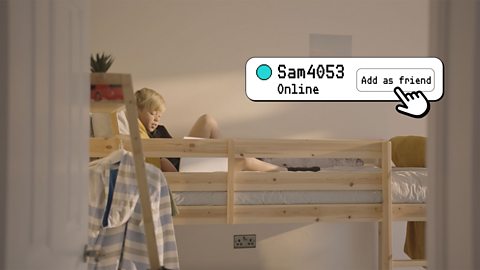
What is online reputation? video
Explains how the things we do online create a digital footprint, and the possible positives and negatives involved when leaving this footprint.
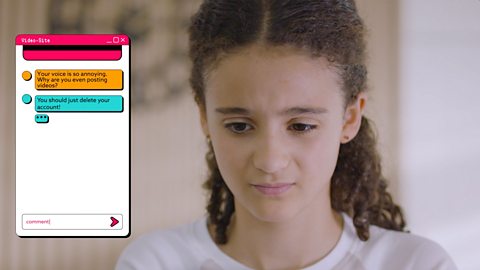
What is online bullying? video
Introduces the topic of online bullying and what this could look like, as well as giving some ideas of what to do if you encounter it.
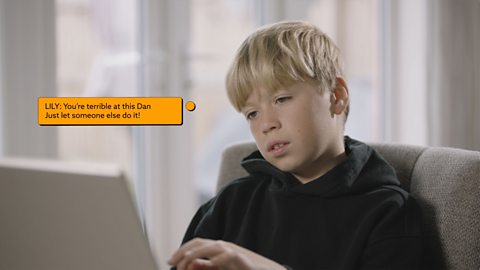
How to find reliable information online. video
An introduction to the topic of managing online information – discussing the positives and negatives.
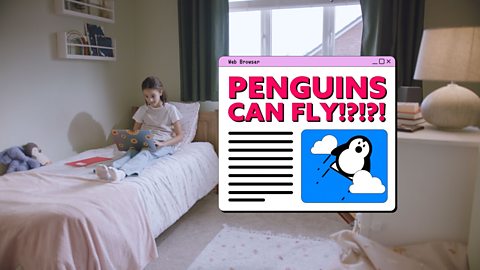
How to balance your screen time – health and wellbeing online. video
Explains that going online can have positive and negative impacts, so we need to balance our time online and offline.
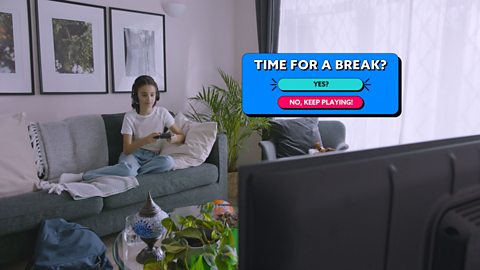
How to keep your information safe online video
Introduces the topic of privacy and security, explaining that personal information shouldn’t be shared online and that passwords should be strong.
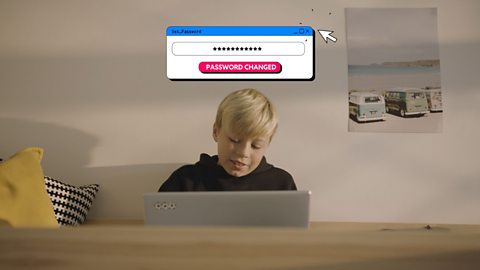
What is copyright and ownership? document
Introduces the topic of 'copyright and ownership', explaining that the creative content that people post online belongs to them.

Scams: Safer Internet Day resources for 7-11-year-olds. video
Introduces the topic of scams, explaining that people online sometimes try to trick us into giving them personal information or money.

Phishing: Safer Internet Day resources for 7-11-year-olds. video
Introduces the topic of phishing, explaining that it is when someone tries to trick you into giving out your personal details online, like passwords or bank information.
